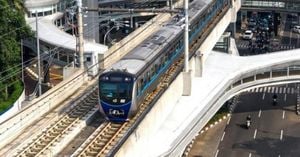Tren de Aragua, the notorious Venezuelan gang, has been thrust back under the spotlight following revelations of its extensive criminal activities and connections to political machinations both within and outside Venezuela. Recent documents obtained by America First Legal (AFL) have unveiled alarming details about the gang's influence on U.S. soil, particularly in Aurora, Colorado, where local officials failed to address the threat posed by the gang for more than a year.
According to the documents, which reveal communications from the Aurora Police Department (APD), local authorities were aware of Tren de Aragua's violent criminal activities as early as June 2023 but did not publicly warn citizens until August 2024, after viral footage captured the gang's takeover of the Edge of Lowry apartments.
“The nonprofit ‘Organization Papagayo’ placed Venezuelan illegal aliens in Aurora apartments owned by CBZ Management, possibly introducing TdA gang members to the Aurora area,” the reports detail. Their activities ranged from shootings and stabbings to more heinous crimes such as sexual assault and robbery. With crime statistics indicating nearly double the violent incidents at specific apartment complexes year-on-year, the community was left vulnerable for far too long.
The uproar was intensified by the connection between Tren de Aragua and the Biden administration's immigration policies, hindering local law enforcement from cooperating with federal agencies like ICE. This situation has resulted in critics—mainly from the Republican party—calling for changes to Colorado’s sanctuary city laws, which prevent cooperation with immigration enforcement. Colorado Governor Jared Polis stated he welcomes federal agents, yet many feel the sanctuary policies are endangering citizens.
On the national stage, Tren de Aragua's influence has crossed borders. Allegations have emerged against the Venezuelan government, particularly with accusations of its involvement in the murder of former military officer Ronald Ojeda. Chilean authorities are pursuing extradition of suspected gang members accused of kidnapping Ojeda, whose dismembered body was found less than two weeks after his disappearance. Witness testimonies suggest top Venezuelan officials may have ordered his assassination, creating tension as Chile seeks justice.
Chilean Interior Minister Carolina Tohá noted the nation would pursue extradition requests for involved Venezuelan officials if evidence surfaced linking them to the crime. Emphasizing the strained relations, she stated, “From the point of view of the channels at the government level, we are in the situation of the greatest cooling we have had with Venezuela.” The investigative probe presents potential ramifications for the Venezuelan government, already grappling with scrutiny over its ties to criminal organizations.
The relationship between Tren de Aragua and the Venezuelan government is complex and uncertain. Once seen as beneficial allies, the gang's recent economic and security crackdowns indicate shifting dynamics. Allegations suggest President Nicolás Maduro and other leaders have stripped the gang of previous protections, leading to arrests and confrontations within Venezuela.
Despite the apparent internal conflict, external operations suggest Tren de Aragua remains a substantial threat beyond Venezuelan borders. Reports indicate gang members have established bases as far as New York City, where FEMA funds supposedly supported hotels housing migrants and, by extension, condemned gang affiliates. This has left critics questioning government efficacy and the potential for corruption within entities like FEMA.
“I have clawed back the full payment to NYC migrant hotels, which serve as Tren de Aragua’s base of operations,” said Homeland Security Secretary Kristi Noem. The comments evoke strong responses from those both supporting and opposing strict immigration enforcement as they add fuel to already heated debates surrounding safety and national security.
With more than 43,000 illegal immigrants reportedly entering the Denver metro area since late 2022, the financial burden this influx places on local resources has reached approximately $80 million across various services, excluding healthcare and education. The costs are igniting discussions about how effective policies can be balanced against humanitarian needs.
Condemnation over the gang's activities is echoed by multiple sides of the political spectrum. AFL's Michael Ding notes the apparent disregard from progressive politicians for the ramifications of illegal migrant criminal gangs operating on U.S. soil. His remarks underline the need for transparency and accountability as communities attempt to confront these challenges.
Meanwhile, as authorities work to dismantle Tren de Aragua's influence within the U.S., the gang remains a livelihood for many. It operates through intimidation, extortion, and violence, with documented incidents involving vehicle theft, drug trafficking, and assaults—capturing national attention and inciting calls for action.
The complexity of this interconnected story hints at larger issues within immigration policy, public safety, and international relations. From the chaos within Aurora to political dramas playing out across Latin America, Tren de Aragua serves as both symptom and catalyst for broader systemic problems exacerbated by governance failures, making it imperative for officials from all levels to reckon with the consequences of these gang activities.



